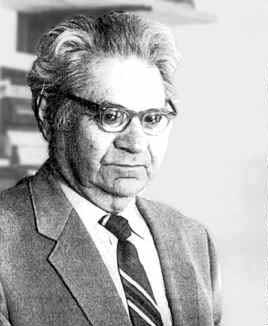Mikhail Samuilovich Livsic

Born: 4 July 1917 in Pokotilova (near Uman), Ukraine
Died: 30 March 2007
Moshe Livsic's family moved to Odessa when he was four years old since his father had been appointed professor of mathematics at the Academy there. The family were Jewish and Livsic brought up in a very religious household. He was introduced to mathematics from a young age at his home where Chebotaryov, Kagan and Shatunovsky were frequent visitors.
Livsic graduated from school in 1931 and, with a school friend, planned his future studies. His aim was to study philosophy but first he would have to study physical sciences. However to be successful in the physical sciences Livsic and his friend would first have to become knowledgeable in mathematics. However, as he wrote, see [1]:-
I succeeded in thoroughly studying some fields in mathematics. I succeeded less in studying some fields in physics. There was no time for philosophy.
Livsic began studies at Odessa technical College aimed at his becoming a radio technician but, in 1933, he entered the Department of Physics and Mathematics at Odessa State University. This department had only recently opened. There he was taught by M G Krein, M A Naimark and, a couple of years later, by B Ya Levin. He was particularly interested in the courses in complex variable, integral equations and differential equations. These courses presented the latest research results.
Livsic took part in the functional analysis seminar and studied analytic functions. In fact [1]:-
He used the ideas, techniques and methods of analytic function theory throughout all his research.
He remained at Odessa working for his doctorate under Krein's supervision. However his interests changed over time. His Master's Degree was achieved with a thesis in quasianalytic functions, then he became interested in operator theory which came out of earlier work he had done on the moment problem. At this time Livsic's studies were much influenced from his reading works by M H Stone, von Neumann, N I Akhiezer and A Y Plessner.
During World War II Livsic avoided military service since his eyesight was poor. However he had to leave Odessa as the German armies advanced and his studies were somewhat disrupted. It was 1942 before he was able to defend his doctoral thesis on Hermitian operator theory and the generalised moment problem. His habilitation thesis on generalisations of von Neumann's extension theory was examined in 1945 by a powerful groups of mathematicians, namely Banach, Gelfand, Naimark and Plessner at the Steklov Institute.
At the end of World War II, Livsic as not invited to return to his post at Odessa since:-
... he was not suited to represent the Ukrainian culture...
Krein was dismissed from his post and the school of functional analysis closed.
After working at Kirovograd, Livsic returned to Odessa to teach at the Hydrometerological Institute which was a minor institution. He remained there until 1957, publishing results on applications of his functional analysis results to quantum theory. From 1957 until 1962 Livsic was head of mathematics at Kharkov Mining Institute, joining Akhiezer at Kharkov State University in 1962.
In 1975 Kharkov made active moves to enable him to go to Israel. He first took a post in the Institute of Agricultural Machines in Tbilisi, then after three years he was able to go to Israel where he was appointed to Ben Gurion University in 1978. Again he began building a research school in operator theory. He is described in [2] as follows:-
Moshe has always been very active and dedicated to his work. His recent breakthroughs in the theory of characteristic functions for several commuting operators indicate that in spite of his seventy years, mathematically Moshe is still a young man. He is loved by his friends, colleagues and students for his wonderful qualities of integrity, honour and benevolence, and respected as a great mathematician.
Article by: J J O'Connor and E F Robertson
June 1997
MacTutor History of Mathematics
[http://www-history.mcs.st-andrews.ac.uk/Biographies/Livsic.html] SOURCE: http://www-groups.dcs.st-and.ac.uk/history/Biographies/Livsic.html |

